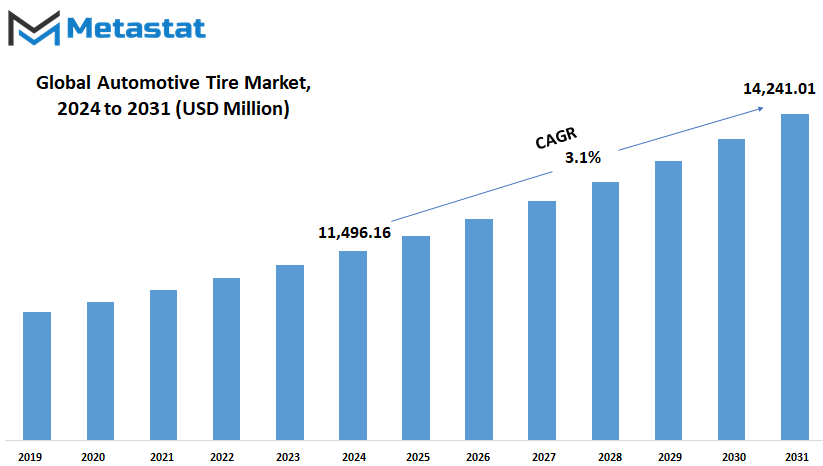MARKET OVERVIEW
The global automotive tire market and its industry are the functions of the global transportation network. With the rising design and technology of vehicles, new and high-performance tires' demand would rise. Tires are vital parts that assure a vehicle's movement without facing any problem in traversing different terrains or weathers. Because of how complex automobile systems have been getting, tyres also had to be more sophisticated, since new types of materials and designs as well as technologies were to be introduced to keep pace with the requirements of new automobiles. Tyre types in the market will be altered according to market trends and customer as well as manufacturer expectations.
Tyres for passenger cars, light trucks, and commercial vehicles will still remain a mainstay of the business. However, in years to come, the business is likely to be spurred by manifold demand for specialty tyres like electric vehicle tyres and autonomous vehicle tyres. So would the industry be oriented towards greener and more sustainable products. In return, it will promote the usage of renewable material, recycling, and lower carbon footprint due to its production. Technology advancement in the automobile sector will be a knock-on effect of the production of tires. There will be more self-driving cars, and this necessitates strong, precise, and high-performance tires. On the other hand, the smart tire is implanted with a kind of high-end technology coupled with highly sophisticated sensors and hence can transfer data of its pressure, wear condition to the onboard system of a car.
The process in design, development, or rather production may itself transform like a paradigm shift advanced technique of manufacturing such as 3D printing may transform. Besides the shift in technology, consumer preferences would eventually shape the future of this market. There would increasingly be a demand for excellent fuel efficiency and performance attributes in tires. This change is primarily influenced by increased fuel prices and environmental awareness, whereby the demand for tires that would make cars perform better and have low fuel consumption will increase. Due to the shift towards electric mobility in the automobile industry, the needs for the tires are going to differ based on the kind of car: whether a traditional gas-guzzler or an electric vehicle. For instance, the EV tires will require better rolling resistance, lower noise, and more durability than the traditional tires the new electric vehicles will come with.
The global nature of the market will also imply international collaboration and competition. As car makers of various regions will be demanding innovation, the manufacturers of tires will be forced to fulfill a broad range of requirements and standards from various countries. As markets become more integrated and interdependent, manufacturers of tyres will be compelled to meet all these factors in order not to lose their competitive edge while the marketplace is getting tougher. New markets in other developing economies will open another growth channel, considering the fact that vehicle owners are increasing there, which, in turn, raises demand for automobile tyres. The Global Automotive Tire market is waiting for a transformation of humongous proportions.
Change in automotive technology, preference, and environment will prompt the tire industry to evolve. Companies will be compelled to innovate non-stop about sustainability, performance, and application of technologies. In the future of the Global Automotive Tire market, adaptation, sustainability, and persistence in improving driving experience shall be key. With electric and autonomous vehicles becoming the norm, the tire market would be upgraded to safety, performance, and efficiency on the road.
Global Automotive Tire market is estimated to reach $14,241.01 Million by 2031; growing at a CAGR of 3.1% from 2024 to 2031.

GROWTH FACTORS
The Global Automotive Tire market is expected to witness robust growth in the years ahead mainly due to various key factors. Firstly, the most outstanding driver for this growth has been the rising demand for vehicles all over the world. With expansion in global economies and an increase in middle-class populations, many consumers can afford personal vehicles, thereby raising demand for tires. This, on the other hand, pushes the industry of tire manufacture forward through the demand placed by this ever-expanding automotive category. Furthermore, technological innovation in tire technology dramatically impacts how this market will move forward into the future. Smart tires that, in addition to measuring performance and pressure levels, have the ability to alert operators are increasing safety while ensuring efficiency in vehicle use. With technological improvements being made, this is to be expected for the future of the market. As manufacturers continue investing in better, more durable tire solutions, the market will propel forward.
The major issue would be the changing prices of raw materials for manufacturing tires. The price of rubber, steel, and other required materials is volatile because of supply chain interruptions, changes in global demand, and environmental conditions. These could cause a fluctuation in prices, affecting the cost structure of the tire manufacturers and making it problematic for them to maintain level production and pricing. There are also regulations concerning disposal and recycling of tires which are so stringent that they make this industry difficult to scale quickly. With governments in many regions of the world passing laws to decrease their impact on the environment, tire-making companies will be compelled to find sustainable means of recycling used tires and reducing the carbon footprint from their respective operations, thus increasing operation costs. Despite all this, the future for the global automotive tire market looks highly promising, especially with more electric vehicles (EVs). With the automobile industry evolving into using cleaner and more energy-efficient alternatives, there will definitely be an increase in the demand for EVs.
Special EV tires will be needed that can handle high torque, last longer, and can deal with unique needs, all of which opens the market to innovation in terms of tire manufacturing to address emerging trends in the electric vehicle market. This will, in turn, gradually affect the design of the tires, making the market more diversified with new products designed to meet the demand of this growing sector. Overall, the Global Automotive Tire market will increase more but will have to face various challenges. Increase in vehicle demands, improvement in technology, and population of electric vehicles will be at the core of this evolution during the coming years. The manufacturers, who can adapt to changes while handling raw material price and regulatory requirements in the competitive industry, will succeed.
MARKET SEGMENTATION
By Tire Type
The Global Automotive Tire market is the dynamic industry in the sector of automotive. Over the following years, as the progress of technology takes place, along with a change in consumer behavior, it will see a considerable increase. Tires are one of the core parts of any vehicle, and its development would be innovation into safety, performance, and sustainability. With the growing demand for vehicles all over the world, the need for quality tires has increased to fulfill several driving conditions. The market is segmented into various types of tires including winter tires, summer tires, and other tire types, along with particular market values. The 3,005.42 million USD value winter tires are used for a better grip in cold, snowy, and icy conditions.
These tires are absolutely safe and perform well on all weather conditions with special rubber compounds and deeper tread design. Increased temperature fluctuations in the planet mean extreme weather patterns within many regions, and, subsequently, increased demand for winter tires, especially among the regions with severe winter weather. This trend is likely to fuel innovation in tire technology leading to more resilient and efficient winter tires for a variety of difficult driving conditions. Summer tires are designed for maximum performance under warm temperatures. Summer tires come valued at 4,002.64 million USD. They are designed for superior handling and braking on dry and wet roads.
Such tires are usually for places whose temperatures do not drop to freezing levels and hence find their application use in most temperate weather. It is expected that, as climate change also influences weather patterns, all areas are likely to incorporate summer tires for longer time use. Additionally, scientific innovation of the materials that tire is made up of is more likely to come up with better summer tires that ensure superior fuel economy and have a longer life of tyre. All other types of tires are valued at 4,488.10 million USD such as all season tyres, off-road tyres, and specialty tyres, all meant to satisfy certain consumers' requirements for either daily travelling, for off-road or for certain vehicles. With the changing consumer preference and the diversification of vehicle types, the demand for these specialized tires will be on the rise. Manufacturers will continue to innovate with a focus on producing tires that offer better performance, durability, and cost-effectiveness in various applications. Looking promising for the future, the Global Automotive Tire market has always focused on producing products responsive to the changing demands of consumers and the automotive sector. The continuous development of advanced tire technologies will be able to contribute to the adaptation of a modern driver's needs within the market while improving overall vehicle safety and environmental sustainability.
By Vehicle Type
The global automotive tire market is likely to record significant growth in the near term, primarily driven by continued growth in vehicle demand coupled with advances in tire technologies. With the continued dynamism of the automotive world, different types of vehicle are contributing in various segments to the expansion of this tire market. The tires market can be broadly put into four key segments including passenger cars, commercial vehicles, two-wheelers and off-road vehicles.
Passenger cars will continue to be the leading category in the global automotive tire market. Increasing disposable incomes, particularly in emerging economies, have led to an increased number of people purchasing personal vehicles. As urbanization increases and cities expand, passenger cars will continue to be in high demand. The passenger car tire will also be more sophisticated with improved fuel efficiency, longer durability, and increased safety. In the future, innovations in tire materials and design will be towards performance improvement of vehicles, reducing environmental impact, and optimizing comfort during driving. This is crucial for passenger car manufacturers to meet consumer expectations for efficiency and sustainability. Commercial vehicles, including trucks and buses, are another significant contributor to the global automotive tire market.
These vehicles are critical for transport and logistics around the world. Demand in commercial vehicle tires will follow with the overall growth of the world economy as the size and weight of these vehicles increase, and as such, it is a good opportunity to advance these tires in durability and capacity to sustain loads. Another factor that will remain vital in the development of commercial vehicle tires into the future is enhancing tires with different kinds of road conditions, minimizing fuel consumption, and boosting safety features. Two-wheelers, including motorcycles and scooters, will continue to be drivers for this market. With an increasingly popular two-wheeler, especially in the densely populated regions, there would also be a corresponding boost in the demand for two-wheeler tires.
In the development of tires, advancements in tire technology that will back the two-wheeler tire market involve better grip, long life, and resistance to wear and tear. Such tires are going to see an increase in demand in countries like India and Southeast Asia because they have two-wheelers as the primary mode of transport. Off-road vehicles, which are used in recreational activities and specialized industries like construction and mining, also constitute a major part of the global automotive tire market. With increasing use of off-road vehicles, especially in developing regions, demand for tires that can offer high performance in harsh conditions will rise. Tires for off-road vehicles are likely to be further innovated to withstand extreme environments while keeping safety and performance intact. The global market for automotive tires is expanding further with advanced technology designed specifically according to the need of various types of vehicles. The more each segment develops, the more demand there will be for specific tires, contributing to the overall development of the market.
By Rim Size
The global automotive tire market is likely to record significant growth in the near term, primarily driven by continued growth in vehicle demand coupled with advances in tire technologies. With the continued dynamism of the automotive world, different types of vehicle are contributing in various segments to the expansion of this tire market. The tires market can be broadly put into four key segments including passenger cars, commercial vehicles, two-wheelers and off-road vehicles.
Passenger cars will still be the category leader in the global automotive tire market. With increased disposable incomes in recent times, especially within the emerging economies, it means that more and more individuals purchase personal vehicles. As a result of increased urbanization, people will continue requiring passenger cars while cities expand in size and geography. Additionally, a more sophisticated passenger car tire will possess higher fuel efficiency, longer life cycles, and enhanced safety. In the future, innovations in tire materials and design will be towards performance improvement of vehicles, reducing environmental impact, and optimizing comfort during driving. This is crucial for passenger car manufacturers to meet consumer expectations for efficiency and sustainability. Commercial vehicles, including trucks and buses, are another significant contributor to the global automotive tire market.
These vehicles are critical for transport and logistics around the world. The demand in commercial vehicle tires would accompany the overall growth of the world economy due to the increase in the size and weight of the vehicles, and thus is an excellent opportunity to advance the development of these tires in durability and capacity to sustain loads. Yet another area where the development of commercial vehicle tires is going to remain alive for the future is with improved tires with various types of road conditions, reduced fuel consumption, and increased safety features. Two-wheelers like motorcycles and scooters will remain as the drivers for this market.
With a very popular two wheeler, especially in the densly populated regions, would automatically boost the demand for the two wheeler tires also. In the development of tyres advanced tire technology that will support two wheeler tyre market involve: better grip, long life as well as resistance towards wearing and tear. Such tires are likely to experience a rise in demand in countries like India and Southeast Asia, where two-wheelers are the primary mode of transport. Off-road vehicles used in recreational activities and specialized industries such as construction and mining form a significant portion of the global automotive tire market. As the use of off-road vehicles is increasing, especially in developing regions, the demand for tires that can deliver high performance in harsh conditions will increase. Tires for off-road vehicles are likely to be further innovated to withstand extreme environments while keeping safety and performance intact. The global market for automotive tires is expanding further with advanced technology designed specifically according to the need of various types of vehicles. The more each of these segments grows, the more the demand for certain tires will be needed and, hence, will develop the market overall.
By Application
The Global Automotive Tire market is expected to witness enormous growth and transformation in the future. With increasing vehicle demand worldwide, the automotive tire industry will change with technological advancements, a shift in consumer behavior, and growing environmental concerns. One of the key factors shaping the future of the market is its Segmentation based on application, which includes on-road and off-road tires, as well as different sales channels, such as Original Equipment Manufacturer (OEM) and aftermarket sales.
On-road tires will remain in high demand due to the increasing number of vehicles on the road worldwide. They are going to be designed such that they offer better fuel efficiency, longer lifetimes, and enhanced performance. Consumers would give importance to safety, comfort, and durability when selecting them for everyday use. This would be followed by further emphasis on making tires in different sizes for different roads and conditions and for varying vehicle sizes, from the compact car to the gigantic SUV.
Off-road tires are also in demand, considering the recent surge in popularity of off-road vehicles and outdoor recreation. These tyres are developed to handle demanding terrains and harsh environments, like mud, gravel, and sand. With more individuals taking on adventure and recreative activities, the requirement for such specialized off-road tyres is expected to surge. Off-road tires of the near future will probably be made with higher strength and are likely to offer greater traction and better stability. These are likely factors that make off-road vehicles attract a larger customer base.
The future of the Global Automotive Tire market is quite largely going to depend upon the sales channels. This will continue with OEM Sales. Tires will always be supplied to automakers to install on new vehicle assembly lines. The aftermarket segment, where replacement tires are used in vehicles already on the road, is expected to grow at a faster pace. The consumers have become more informed and are more likely to opt for better performance, value for money, and environmental benefits with aftermarket tires.
The Global Automotive Tire market will be in a continuous process of evolution with improvements in technology, sustainability practices, and consumer preferences in the coming years. With these needs being met at the factory, the automotive tire market will be known for innovation and an increase in products, moving progressively toward sustainability. Adaptation of both the environmental factors concerning consumers and a shifting automobile landscape will characterise the future of the automotive tire market.
|
Forecast Period |
2024-2031 |
|
Market Size in 2024 |
$11,496.16 million |
|
Market Size by 2031 |
$14,241.01 Million |
|
Growth Rate from 2024 to 2031 |
3.1% |
|
Base Year |
2022 |
|
Regions Covered |
North America, Europe, Asia-Pacific Green, South America, Middle East & Africa |
REGIONAL ANALYSIS
The global automotive tire market is an important part of the automobile industry, influencing vehicle performance, safety, fuel efficiency, and the general experience of driving. In consideration of its growth, regional dynamics must be considered as it affects the market. The tire market can be segmented into several major regions: North America, Europe, Asia-Pacific, South America, and the Middle East & Africa. Each region will contribute its uniqueness in influencing demand and growth. Going forward, both the areas will change over time but will bring more challenges to the table rather than presenting opportunities.
The global market for automotive tires has key players like the North America region that contains the United States, Canada, and Mexico. This region would be one of the important hubs as its automotive industry is very developed and more vehicles are sold. Demand for tires in this region is being driven by replacement demand, given the aging vehicle fleet in many countries. Consumers in North America are also becoming increasingly interested in eco-friendly and fuel-efficient tire options as environmental concerns grow. The future of the market in this region is likely to be influenced by the developments in tire technology and materials, as well as the increasing popularity of electric vehicles.
Europe, which includes the UK, Germany, France, Italy, and other countries, has been a hub for automotive innovation for many years. Strict environmental regulations and a drive towards sustainable mobility will ensure that low-rolling resistance tires and high-performance options are in greater demand. Germany is one of the largest automobile manufacturers in the region and, therefore, a significant player in the regional tire market. As electric vehicles and autonomous driving technologies continue to gain momentum in Europe, the tire market will see changes in the design and performance requirements for tires to meet the demands of these new vehicle types.
Asia-Pacific, including countries like China, India, Japan, and South Korea, is the largest and the fastest-growing market for automotive tires. China's vast automotive industry and expanding middle class create an ever-growing demand for both replacement and original equipment tires. Growing automotive sector and increasing vehicle ownership in India will contribute to the region's growth in the coming years. For another, Japan and South Korea are home to some of the world's leading tire manufacturers, so technological innovation and premium tire brand development will be a key priority in Asia-Pacific.
South America is dominated by countries like Brazil and Argentina in terms of the automotive tire market. As the region's automotive industry matures, demand for tires will increase because of a growing middle class and increased vehicle sales. Road infrastructure development in Brazil will also help the expansion of the market.
The Middle East & Africa region, comprising countries such as the GCC nations, Egypt, and South Africa, is another promising market for automotive tires. The growing automotive market in the GCC countries, along with an increasing focus on infrastructure development, will drive tire demand. South Africa, being a hub for automobile production in Africa, will play a central role in the region's tire market growth.
There would be regional shifts within the global automotive tire market going forward, affected by both economic growth, technology innovations, and new consumers with different needs and tastes in the years to come. The drive toward sustainability and safety will push forward to shape the market as innovations ensure each region follows suit with the evolution in automobile needs.

COMPETITIVE PLAYERS
The global automotive tire market is rapidly changing and will see major developments as the demand for vehicles rises and technology advances. Under increasing pressure from the perspective of sustainability and safety, leading players in the market are adapting to meet such challenges and opportunities. At the forefront of innovation is Michelin, Bridgestone, Goodyear, and Continental, as these companies are continuously looking to improve tire technology, performance, and environmental impact. These leaders will not only be market dominators but also transform the market with new tire designs, materials, and manufacturing processes.
For instance, Michelin and Bridgestone are focusing on developing green tires. With increased attention toward climate change, the automotive tire market is slowly moving toward creating products with a smaller carbon footprint. It covers the tires made from green material and is energy-friendly. This means less release of CO2 in a vehicle. Bridgestone especially promotes the production of more recyclable tires and reduces the harmful impact to the environment when the cycle is over. Similar developments include the ones of Michelin with respect to the energy-saving tire technology that promotes reduction of the total amount of energy spent by automobiles.
Goodyear and Continental also engage in this line of developing smart tire technologies that aim to bring the tire better performance, efficiency, and safety since the tire contains sensors, including the one monitoring its pressure, temperature, and tread wear. This has resulted in better judgment of tyre condition and appropriate decisions towards better driving, and for extended tire lives. Moreover, these companies are currently also researching to create driverless car technology and flexible tyres that adjust according to changing driving conditions.
Others would be Pirelli Tyre, Hankook Tire, and Yokohama Rubber, who are positioning themselves to further strengthen global presence while pursuing new emerging markets. Companies like Kumho Tire and Sumitomo Rubber Industries Ltd are gaining market share through more affordable yet quality products with a wide range of coverage for consumers. This will raise competition among these firms and create a race for technological advancement and innovative products appealing to environmentally conscious and safety-driven consumers.
This, however, will make the global automotive tire market even more dynamic and competitive with car manufacturers pushing for greener and more efficient solutions. The companies manufacturing tires would then be the means through which such demands will be met. Whether this comes in the form of ecologically friendly tire manufacture, smart tire technologies, or adaptation to new trends within the vehicle industry, more innovations and possibilities shall unfold, changing the course through which tires are made and used all over the world.
Automotive Tire Market Key Segments:
By Tire Type
- Winter Tires
- Summer Tires
- Other Tire Types
By Vehicle Type
- Passenger Cars
- Commercial Vehicles
- Two-wheelers
- Off-road Vehicles
By Rim Size
- Less Than 15 Inches
- 15 to 20 Inches
- More than 20 Inches
By Application
- On-road
- Off-road
- Sales Channel
- Original Equipment Manufacturer (OEM)
- Aftermarket
Key Global Automotive Tire Industry Players
- Michelin
- Bridgestone Corp.
- Goodyear
- Continental
- Pirelli Tyre S.p.A
- Hankook Tire
- Sumitomo Rubber Industries Ltd.
- Yokohama Rubber
- Cooper Tire & Rubber Company
- Toyo Tire Corporation
- Falken Tire
- Kumho Tire
- Nexen Tire
- Apollo Tyres LTD
- MRF Tyres
- Giti Tire
- Zhongce Rubber Group Co., Ltd.
- JK Tyre & Industries
- Nokian Tyres
- CEAT Limited
- Sailun Group Co., Ltd.
- Salsons Impex Pvt. Ltd
- Shandong Linglong Group Co. Ltd.
- Wanli Tire Co., Ltd.
- Triangle Tire Co., Ltd.
WHAT REPORT PROVIDES
- Full in-depth analysis of the parent Industry
- Important changes in market and its dynamics
- Segmentation details of the market
- Former, on-going, and projected market analysis in terms of volume and value
- Assessment of niche industry developments
- Market share analysis
- Key strategies of major players
- Emerging segments and regional growth potential











 US: +1 3023308252
US: +1 3023308252






